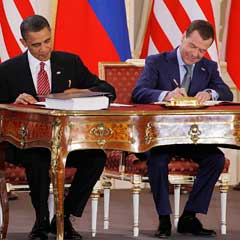U.S. bishops mobilize support for arms pact
By Dennis Sadowski, Catholic News Service WASHINGTON - U.S. Senate ratification of the new Strategic Arms Reduction Treaty is a moral imperative and a necessary step toward the eventual goal of total nuclear disarmament, Archbishop Edwin O’Brien of Baltimore said.
WASHINGTON - U.S. Senate ratification of the new Strategic Arms Reduction Treaty is a moral imperative and a necessary step toward the eventual goal of total nuclear disarmament, Archbishop Edwin O’Brien of Baltimore said.Speaking during an April 26 panel discussion on the ethics of President Barack Obama’s nuclear weapons policy hosted by The Catholic University of America, O’Brien urged senators to cast aside partisan differences and approve the START agreement, which calls for what he described as “modest reductions” in American and Russian nuclear arsenals.
Signed April 8 in Prague, Czech Republic, by Obama and Russian President Dmitry Medvedev, the START “follow-on” treaty calls for both countries to reduce their strategic arsenals — weapons deployed on long-range missiles, bombers and submarines — to 1,550 each. Under the previous START pact, which expired in December, both countries reduced their strategic arsenals to 2,200 weapons each.
The Russian Duma also must approve the treaty, and from that point, both countries will have seven years to reach the agreement’s targets.
The archbishop’s call is the most recent public step by the U.S. Conference of Catholic Bishops and Church leaders to build support for the new round of nuclear disarmament among Catholics in the pews as well as across the wide gap separating Senate Democrats and Republicans.
START again will be on the agenda when members of the bishops’ Committee on International Justice and Peace meet May 13 in Washington.
O’Brien, a committee member and former head of the archdiocese for the Military Services, told Catholic News Service efforts are needed in as many circles as possible to build momentum for the treaty’s ratification. That means mobilizing Catholics to contact their senators urging them to support the pact.
“We have to get at these senators ... and build the tide,” O’Brien said.
One vehicle to mobilize Catholics, he suggested, is the nationwide network of state Catholic conferences, which could distribute information on the issue already developed by the bishops’ Department of Justice, Peace and Human Development.
Panelist Rose Gottemoeller, assistant secretary of state in the Bureau of Verification, Compliance and Implementation and the lead U.S. negotiator of the treaty, told CNS the agreement gives the country an “opportunity for moral leadership” in the drive for worldwide nuclear disarmament. She said she expects the agreement will be ratified because it contains new verification steps that consider the best interests of both countries.
“I believe that we can make a very good case for it,” said Gottemoeller, a Catholic. “It is a transitional treaty. It’s a step in the right direction. It is not a radical reduction. We want to eventually move in that direction, but at this moment we need to put in place a solid foundation that will give us the verification regime that we no longer have.”
Please support The Catholic Register
Unlike many media companies, The Catholic Register has never charged readers for access to the news and information on our website. We want to keep our award-winning journalism as widely available as possible. But we need your help.
For more than 125 years, The Register has been a trusted source of faith-based journalism. By making even a small donation you help ensure our future as an important voice in the Catholic Church. If you support the mission of Catholic journalism, please donate today. Thank you.
DONATE
